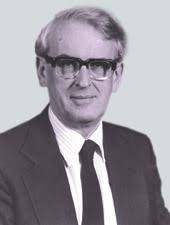David Chilton Phillips
David Chilton Phillips, Baron Phillips of Ellesmere (1924–1999) was a distinguished British biophysicist and molecular biologist, renowned for his pioneering work in the field of protein crystallography. His most notable achievement was the determination of the three-dimensional structure of lysozyme, an enzyme found in tears, saliva, and egg whites that destroys bacterial cell walls. This work, completed in 1965, marked the first time the structure of an enzyme was elucidated, significantly advancing the understanding of how enzymes function at a molecular level.
Early Life and Education[edit | edit source]
David Chilton Phillips was born on March 7, 1924, in Ellesmere, Shropshire, England. He pursued his education at the University of Wales, where he received his Bachelor of Science degree. He furthered his studies at the University of London, earning a PhD in X-ray crystallography, a field that would define his career.
Career[edit | edit source]
Phillips began his career in science at the Royal Institution in London, where he worked under the guidance of the renowned crystallographer Rosalind Franklin until her untimely death in 1958. He then moved to the Laboratory of Molecular Biology in Cambridge, where he embarked on his groundbreaking research on lysozyme.
In 1966, following his success with lysozyme, Phillips was appointed Professor of Molecular Biophysics at the University of Oxford, a position he held until his retirement. During his tenure at Oxford, he established the Laboratory of Molecular Biophysics and continued his research on the structure and function of proteins. He was instrumental in developing the field of protein engineering, which seeks to design new proteins or modify enzyme functions.
Contributions to Science[edit | edit source]
Phillips' work on lysozyme laid the groundwork for the development of drug design and has had a profound impact on the fields of biochemistry and pharmacology. By revealing how the enzyme cleaves the polysaccharide chains of bacterial cell walls, his research provided insights into the mechanism of enzyme action at the atomic level.
Beyond his research, Phillips was a dedicated educator and advocate for science. He was deeply involved in science policy and served on various advisory committees in the UK, promoting the importance of science and technology in society.
Honours and Awards[edit | edit source]
In recognition of his contributions to science, Phillips was knighted in 1979 and was made a life peer as Baron Phillips of Ellesmere in 1994. He was a fellow of the Royal Society and received numerous awards, including the prestigious Copley Medal.
Legacy[edit | edit source]
Lord Phillips of Ellesmere passed away on February 23, 1999, leaving behind a legacy that continues to influence the fields of molecular biology and biophysics. His work not only advanced our understanding of enzyme structure and function but also paved the way for the development of new therapeutic strategies against bacterial infections.
Navigation: Wellness - Encyclopedia - Health topics - Disease Index - Drugs - World Directory - Gray's Anatomy - Keto diet - Recipes
Search WikiMD
Ad.Tired of being Overweight? Try W8MD's physician weight loss program.
Semaglutide (Ozempic / Wegovy and Tirzepatide (Mounjaro / Zepbound) available.
Advertise on WikiMD
WikiMD is not a substitute for professional medical advice. See full disclaimer.
Credits:Most images are courtesy of Wikimedia commons, and templates Wikipedia, licensed under CC BY SA or similar.Contributors: Prab R. Tumpati, MD

